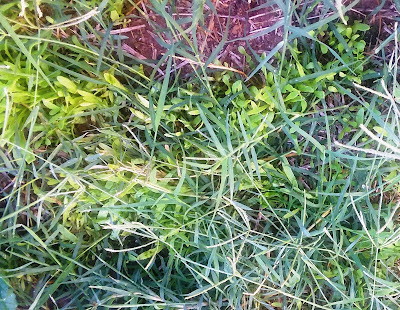(Valentine's Day and Ash Wednesday arrive on the same day this year. This poem is an early preview for both. It deals with the "heart" in the most important way. It is a nice Lenten reflection, of course.)
Am I a stone, and not a sheep*,
That I can stand, O Christ, beneath Thy cross,
To number drop by drop Thy blood’s slow loss,
And yet not weep?
Not so those women loved
Who with exceeding grief lamented Thee;
Not so fallen Peter, weeping bitterly;
Not so the thief was moved**;
Am I a stone, and not a sheep*,
That I can stand, O Christ, beneath Thy cross,
To number drop by drop Thy blood’s slow loss,
And yet not weep?
Not so those women loved
Who with exceeding grief lamented Thee;
Not so fallen Peter, weeping bitterly;
Not so the thief was moved**;
Not so the Sun and Moon
Which hid their faces in a starless sky,
A horror of great darkness at broad noon –
I, only I.**
Yet give not o’er,
But seek Thy sheep, true Shepherd of the flock;
Greater than Moses***, turn and look once more
And smite a rock*.
Which hid their faces in a starless sky,
A horror of great darkness at broad noon –
I, only I.**
Yet give not o’er,
But seek Thy sheep, true Shepherd of the flock;
Greater than Moses***, turn and look once more
And smite a rock*.
--Christina Rossetti, 1866
*She's saying her heart is like a stone because she's not moved to tears over Christ's crucifixion like a "sheep", a "true follower" (John 10) would be. She picks up the idea again at the end, asking Christ to break her heart of stone.
**The women at the cross, the repentant Peter, even one of the thieves crucified with Jesus were moved to sorrow. Even the Sun was somehow darkened from about noon to 3 pm, at a time when it could NOT have been a solar eclipse (full Moon). Nature itself expresses sadness, but the poetess indicates she feels strangely unmoved.
***Deuteronomy 18: Christ was prophesied as the New Prophet, greater than Moses. He is also the Shepherd (John 10; Psalm 23). Moses broke open a rock to get water out of it (Numbers 20), but Christ does a greater thing by breaking open hearts of stone.
*She's saying her heart is like a stone because she's not moved to tears over Christ's crucifixion like a "sheep", a "true follower" (John 10) would be. She picks up the idea again at the end, asking Christ to break her heart of stone.
**The women at the cross, the repentant Peter, even one of the thieves crucified with Jesus were moved to sorrow. Even the Sun was somehow darkened from about noon to 3 pm, at a time when it could NOT have been a solar eclipse (full Moon). Nature itself expresses sadness, but the poetess indicates she feels strangely unmoved.
***Deuteronomy 18: Christ was prophesied as the New Prophet, greater than Moses. He is also the Shepherd (John 10; Psalm 23). Moses broke open a rock to get water out of it (Numbers 20), but Christ does a greater thing by breaking open hearts of stone.


.jpg)


















